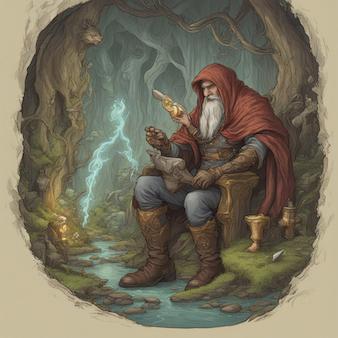Language is one of the defining aspects of a culture, and when it comes to fantasy worlds, this is no exception. A unique and richly developed fantasy language can add a layer of depth and realism to a fictional world, making it feel more complete and immersive for the reader. But building a fantasy language from scratch can be a daunting task, especially for those who are not linguists or language enthusiasts. In this article, we will explore some tips and strategies for building a unique fantasy language that feels authentic and fully realized.
Building a Fantasy Language
Define the purpose and scope of the language

Before starting to build a language, it is important to define its purpose and scope. Will the language be used only for names and titles, or will it have a more significant role in the story or worldbuilding? Is it a language spoken by a particular race or culture, or is it a universal language that everyone speaks? By defining the purpose and scope of the language, you can better tailor its development to fit the needs of your story.
Start with basic vocabulary and grammar
Once you have defined the purpose and scope of the language, it is time to start building its foundation. Start with basic vocabulary, such as pronouns, common nouns, and verbs. These words will form the building blocks of the language and will be used to construct more complex sentences and ideas. Similarly, define the basic grammar rules, such as word order, tense, and conjugation, that will give structure to the language.
Incorporate cultural elements
A language is not just a set of words and rules; it is also a reflection of the culture that speaks it. As such, it is important to incorporate cultural elements into the language to make it feel more authentic. Consider the values, beliefs, and traditions of the culture that speaks the language and how these might be reflected in the words and grammar. For example, a culture that values community and cooperation might have words that emphasize these concepts, while a culture that values individualism and self-reliance might have words that reflect those values.
Use sound symbolism and word derivation
Sound symbolism is the idea that the sound of a word can convey its meaning or emotion. For example, words that contain the letter “s” might sound sharp and hissing, conveying a sense of danger or menace. Using sound symbolism can add depth and richness to a language and make it more evocative for the reader. Similarly, word derivation is the process by which new words are formed from existing ones, such as adding prefixes or suffixes. Using word derivation can make a language feel more natural and organic, as well as help to create a sense of continuity between related words.
Create a writing system
A writing system is an essential part of any language, as it allows it to be recorded and preserved over time. Depending on the purpose and scope of the language, you may want to create a unique writing system that reflects the culture and values of the people who speak it. Consider the materials that would be used to write the language, such as clay tablets, parchment, or paper, and how this might influence the design of the writing system. You may also want to consider the aesthetic qualities of the writing system, such as whether it is ornate or minimalist, and how this might reflect the culture that created it.
Test the language
Once you have developed the basic structure of the language, it is important to test it to ensure that it is functional and consistent. This can be done by constructing simple sentences and seeing how they work in practice. You may also want to try speaking the language out loud to see how it sounds and flows. Testing the language can also help you identify any inconsistencies or areas where the language needs further development.
Expand the language
Once you have established the basic structure of the language, you can start to expand it to include more complex concepts and vocabulary. Consider the needs of the story or worldbuilding and how the language can be developed to meet those needs. This may include creating specialized vocabulary for different professions or concepts, or developing slang or dialects for different regions or groups within the culture. As you expand the language, continue to test it to ensure that it remains consistent and functional.
Use the language sparingly
While a unique fantasy language can add depth and realism to a story, it is important to use it sparingly. Overuse of a fictional language can make the story difficult to follow and may distract from the plot or characters. Use the language only when necessary to convey important information or to add to the atmosphere of the story.
Building a unique fantasy language can be a challenging but rewarding task for writers and worldbuilders. By defining the purpose and scope of the language, developing its basic structure, incorporating cultural elements, using sound symbolism and word derivation, creating a writing system, testing the language, expanding it, and using it sparingly, you can create a language that feels authentic and fully realized. Whether the language is used for names and titles or has a more significant role in the story or worldbuilding, a well-developed language can add a layer of depth and richness to a fictional world that will captivate and immerse readers.
Keywords: fantasy language, worldbuilding, writing system, sound symbolism, word derivation, cultural elements, vocabulary, grammar, consistency, sparing use, building a fantasy language, fantasy language for fiction, writing a fantasy language, fantasy language tips
Check out our Novel Writing Workbooks
Check out Little Tree Food Forest for articles on food forests and homesteading.
Check out FoodieScapes for articles on growing, fermenting and preserving food
Check out StoryScapes.World for articles on writing.
Subscribe to our newsletter to get information delivered to your inbox on how to write a book, outlining your novel, keeping journals, marketing your novel, self-publishing, writing poetry and more.










